Kurdish PM:
Iraqi Violence Will Not Spill Over into Kurdistan Region
Voice of America, By Margaret Besheer, 30 June 2006
As much of Iraq seeks security and stability, the Kurdistan Region in the north has enjoyed relative peace and growing prosperity. Since 1999, a young, charismatic politician from a prominent Kurdish family has been prime minister of this region.
At 39 years old, Nechirvan Barzani is one of the younger political leaders on the world scene. His father-in-law, Massoud Barzani, is president of the Kurdistan Region, and the Barzani family has been prominent in Kurdish politics and the fight for autonomy for decades through its Kurdistan Democratic Party (KDP).
The Kurdistan region is part of Iraq, but since 1992 has had its own elected parliament and run its affairs. The Kurdistan Region encompasses the three northern provinces of Dahuk, Irbil, and Sulaimaniyah. Unlike other areas of Iraq, the region has few security problems.
As violence continues to ravage Baghdad and other parts of the country, Prime Minister Barzani says he does not believe Iraq has descended into a civil war.
"The fight is over Baghdad," he says, "This is the problem that is happening. Yes, we are facing serious problems in Baghdad, especially between the Shiites and the Sunnis, but I cannot call it a civil war."
Barzani says he does not believe the violence will spill over into the Kurdistan Region because there are no sectarian problems here.
At a time when Iraq looks ready to split apart, Mr. Barzani says although the Kurdish people would like their own state, the Kurdistan Region is not seeking statehood.
"Sometimes it is important for people to differentiate between dreams and what is the reality on the ground," he says. "But he would not rule out seeking an independent state in the future, saying only that at this stage, it is not in the interest of the Kurdish people."
What he does believe is in their interest, is a democratic, federal Iraq that respects its own people.
But one major issue remains to be resolved between Kurdistan and the central government. That is the status of the oil-rich city of Kirkuk.
Under Saddam Hussein, many Arabs were sent to live in Kirkuk to displace Kurds, Turkmen and Christians living in the city. Ethnic tensions continue there today and a referendum has been scheduled for next year to decide whether Kirkuk will be included in the Kurdish autonomous region.
Barzani says he is doubtful the referendum will take place on time, as preparations have been delayed. He also disputes the view that it is the city's oil that makes it so valuable.
He says, the issue is not one of oil, but an issue of land; the issue of the oppression that has been practiced against the people there.
Turkey, Iran and Syria are Kurdistan's neighbors. Although decisions about foreign relations remain the exclusive domain of the central government in Baghdad, Barzani says his government's policy is to have good relations with all its neighbors.
Barzani grew up in Iran, and his KDP party, as well as Kurdistan's other major political group, the Patriotic Union of Kurdistan (PUK), have both had alliances with Tehran in the past. Recently, Irbil hosted an Iranian-business exhibition.
As Iran becomes increasingly isolated in the world, Barzani diplomatically says his government has had good relations with Iran in the past and hopes that will continue.
He adds, Iran helped us at a time when all the other countries in the world were backing Saddam.
But relations with Turkey are more sensitive. Kurdish rebels, known as the Kurdistan Workers Party have launched attacks into Turkey from their bases in the mountains of northern Iraq. Recently, Turkey's prime minister said he is considering cross-border raids into northern Iraq to clear out PKK bases.
"Even if the Turkish army comes in they will not be able to solve this problem. Even if they have the U.S. military with them they will not be able to solve the problem, because the problem is a political one. We believe Turkey should think of a political solution to this problem," Barzani says.
Nechirvan Barzani also oversees an ambitious domestic program. Reconstruction is visible in the large cities, but has been slower to reach rural villages and towns. The education system is woefully lacking and many foreign businessmen complain of difficulties in finding qualified local workers.
The prime minister says this is the result of living under years of international sanctions and the destruction Saddam's regime caused his region. But he says the situation is gradually improving.
Parliament recently passed a new foreign investment law, which Barzani hopes will be the key to drawing new capital to his region.
He says Kurdistan is ready for business, and he sees the region as a gateway to the rest of Iraq.
Click here for press enquiries. |
Quote
|

Nechirvan Barzani, Prime Minister, Kurdistan Region in Iraq
 As much of Iraq seeks security and stability, the Kurdistan Region in the north has enjoyed relative peace and growing prosperity. Since 1999, a young, charismatic politician from a prominent Kurdish family has been prime minister of this region. The Kurdistan region is part of Iraq, but since 1992 has had its own elected parliament and run its affairs. The Kurdistan Region encompasses the three northern provinces of Dahuk, Irbil, and Sulaimaniyah. Unlike other areas of Iraq, the region has few security problems.
As much of Iraq seeks security and stability, the Kurdistan Region in the north has enjoyed relative peace and growing prosperity. Since 1999, a young, charismatic politician from a prominent Kurdish family has been prime minister of this region. The Kurdistan region is part of Iraq, but since 1992 has had its own elected parliament and run its affairs. The Kurdistan Region encompasses the three northern provinces of Dahuk, Irbil, and Sulaimaniyah. Unlike other areas of Iraq, the region has few security problems.

|
|


